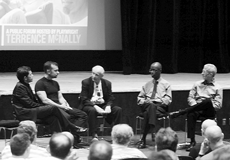Several hundred turn out for forum on growing older in queer New York
A forum on gay men and mid-life drew roughly 250 men and women to the Fashion Institute on Technology on May 16.
“Mid-life can be puzzling for gay men,” said Bruce Kellerhouse who, along with Dan Carlson, founded the HIV Forum in 2003. “We’re no longer young, but we’re not yet old. We are bombarded by youthful images in both gay and mainstream press. We don’t have many visible role models for what it means to be a gay man at mid-life. As we look around us, we see fewer and fewer faces that look like us. Yet, there must be some positive aspects to mid-life.”
The HIV Forum has produced a series of town meetings since November 2003 on gay men, HIV, drug use, and related topics. The May 16 event, titled “Our Turn: Perspectives on Gay Men and Mid-Life,” was the eighth such event.
The panel, which was moderated by playwright Terrence McNally, included four gay men ranging in age from 42 to 57 and had varying views on aging and mid-life.
Jorge Colon, 51, said that when he turned 40 he experienced a “sense of isolation, a sense of loneliness.” When he discussed this with friends he felt he was dismissed.
“I had no idea who I was,” Colon said. “I had no idea what I liked. I had lost my sense of self.”
In what resembled a traditional mid-life crisis, Colon eventually ended a relationship of many years, began a new job and “started my adventure as a gay man in his 40s.”
Colon is now in a relationship with a younger man.
“In the last ten years I’ve made more changes in my life than I made in 16 years in recovery,” he said.
John Thompson, 42, said he moved to New York City at 29. While he pursued a successful career and a relationship, he also took part in the city’s lively sex scene. Eventually he started using crystal meth.
“It created this pool of available sex partners,” said Thompson, who is HIV-positive. “It made me feel young… It let me hang out with people who I felt had something I wanted.”
Robert Spellman, 57, moved to New York City from Texas 32 years ago. He eventually started using crack cocaine, which led him to homelessness, unemployment and time in jail. Spellman, who is also HIV-positive, has been in recovery for ten years. His mid-life crisis came when he understood that his life would not resemble the life his parents had built in Texas. He would not have a house and a family.
“I think my mid-life crisis came when I realized I was not going to be able to attain many of those things,” he said.
Paul Miller, 51, handles workshop and forum development for the Stop AIDS project in San Francisco. Miller discussed his own life he also described In Our Prime, a program for gay and bisexual men who are 45 and older that Stop AIDS offers.
In Our Prime has produced more than 60 events including an annual Geezer’s Ball, a name that was controversial, but drew attention to the event, Miller said. The ball takes place on Father’s Day to “celebrate the daddies,” according to Miller.
Miller, who is HIV-positive, described how he changed his life after learning he was infected. He had been working in real estate and banking.
“I had to go through a metamorphosis and decide what was most important to me,” he said.
A theme that ran through the entire two-hour event—indeed it has been present in nearly every HIV Forum event—is where do gay men find a sense of belonging or community.
The use of drugs and alcohol while seeking out sex may be an effort by some gay men to feel connected to a larger group and overcome a sense of isolation or loneliness. Implicit in many comments during the events is that some men discovered a community only after they were infected with HIV and joined support groups or they had had enough of drugs or alcohol and joined a 12-step group and found a community there.
One audience member said, “I became positive in 1989 and it was through becoming positive that I felt connected… Where is the sense of community?”
Kellerhouse responded, “Dan and I have talked about this. How do we create community without something having to happen?”
Following the forum, Kellerhouse said that they have not yet found an answer.
“I don’t think we’ve answered that question,” he said.
gaycitynews.com




































